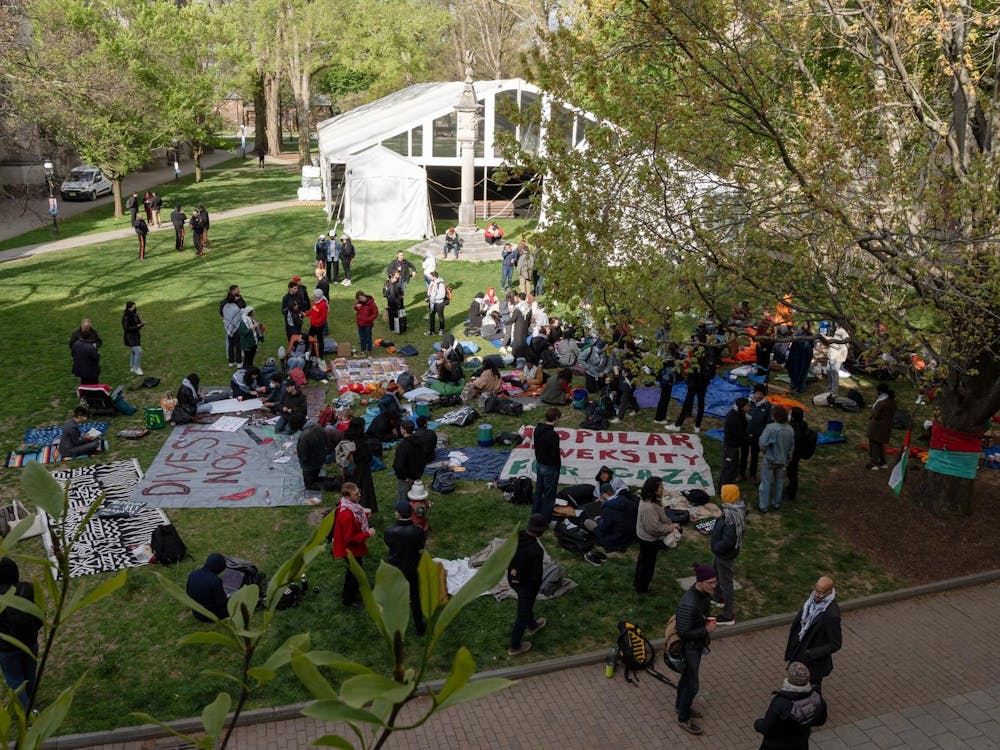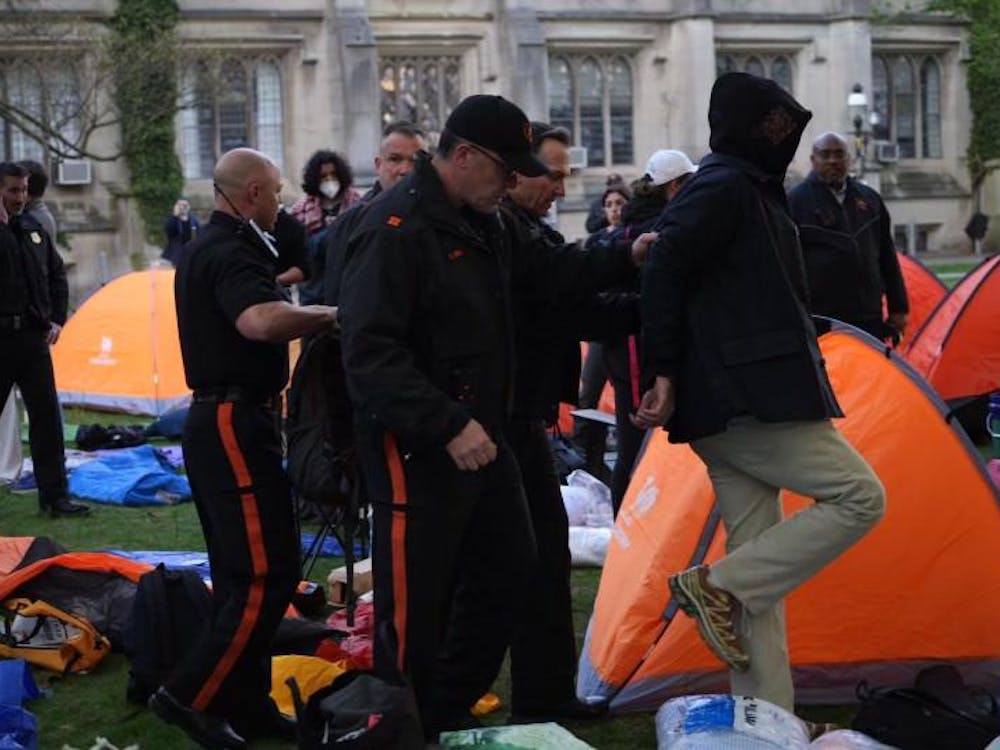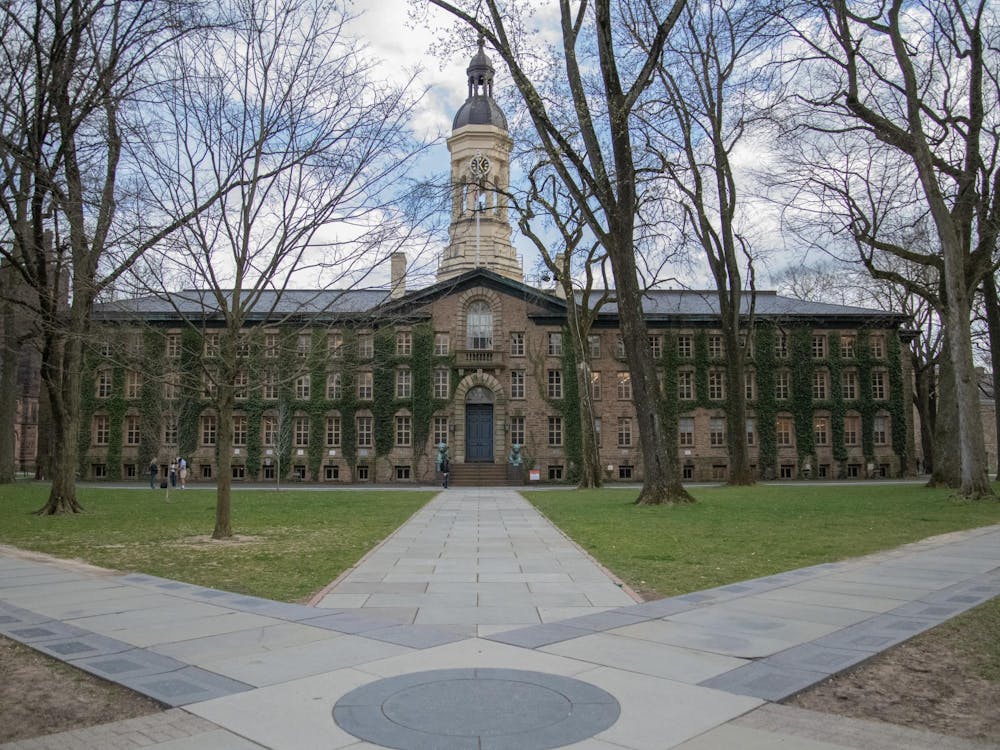Two days after Whig Hall was tagged with graffiti, unknown vandals — apparently Rutgers students — returned Wednesday to finish the job, spray-painting Clio Hall, the Revolutionary War cannon and the two nearby tiger statues.
"Give us a f—kin' game, f—gots," was written in red on the stairs of Clio Hall, followed by a heart and the numbers "443 1869!" The top of the cannon was painted red, while the west and east tigers had "Rutgers" and the letters R and U written across their backs, University spokeswoman Cass Cliatt '96 said.
Public Safety discovered the damage at 5 a.m., and it was cleaned later in the morning.
Individuals claiming responsibility for the vandalism made contact with The Daily Princetonian at 11:21 a.m. on Wednesday. The email, from the address fromrutgerswithlove@yahoo.com, claimed to be from Greg Schiano, Rutgers' head football coach. The 'Prince,' however, attempted a reverse IP address lookup and determined that the email originated in Hicksville, NY.
"Heres a little documentation of the work of us Rutgers students for the second night in a row on Princeton campus," read the email, which included a picture of a defaced Clio Hall.
Schiano and Rutgers' athletic communications department could not be reached for comment.
Upon further prompting, the authors of the email responded with the following, copied exactly: "Were everyday, ordinary, Rutgers students and we want our cannon back, simple as that. It was rather selfish for Princeton to entomb the cannon in concrete when it rightfully belongs to Rutgers. Until Princeton gives it back or finds a reasonable solution to the situation well do are part in making it a burden for Princeton to keep it."
"As much as we consider it a rivalry," the email continued, "its rather one sided. Princeton dosent really beat us in ... well anything. We dominate sports and just about anything else that Princeton students challange us with."
That email was traced by the 'Prince' to a Rutgers student's individual IP address. The 'Prince,' however, was unable to contact that student to determine whether he sent the emails or whether he was involved with the vandalism.
Princeton and Rutgers football met for the last time in 1980, the final game in a five game winning streak for the Scarlet Knights. After losing their first game, 6-4, to Rutgers in 1869 — the first intercollegiate football game — Princeton went on to achieve dominance, winning every subsequent game until 1937. Between 1937 and the stretch of Princeton losses around 1980, the two schools had mixed records.
Public Safety had patrolled the area up until 1 a.m., so the crime must have occurred later in the morning, Cliatt said.
"Officers are in regular patrol of the area in light of this incident and the previous incident," she added, "especially because the incidents occurred in the same general location."

Cliatt also said: "The language was certainly offensive, but the fact that someone would deface property in such a public place at all is the concern. Regardless of the language, this is something that Public Safety would pursue."
Both yesterday's and the previous graffiti contained the number 1869, the year of the first intercollegiate football game. Public Safety does not yet know the meaning of the number 443, but has contacted the Rutgers Police Department to see if they know anything about its significance.
Officers also lack suspects at this time and encourage any witnesses to come forward with information.
The two universities have not competed in football since the 1970s, when Princeton joined Division I-AA. Rutgers remained in Division I-A and this year is ranked in the top-25 nationwide.
According to legend, the Revolutionary War-era cannon was abandoned in Princeton at the end of the conflict, but was moved to New Brunswick — home of Rutgers' main campus — during the War of 1812. Over the course of a few years in the 1840s, local militia and University students brought the cannon back to Princeton, eventually burying it in the center of the grassy area behind Nassau Hall.
USG vice president Rob Biederman '08 said the cannon rivalry "is utterly ludicrous."
"It's not really a rivalry, it's completely one-sided," he said. "They're never getting their cannon back."








